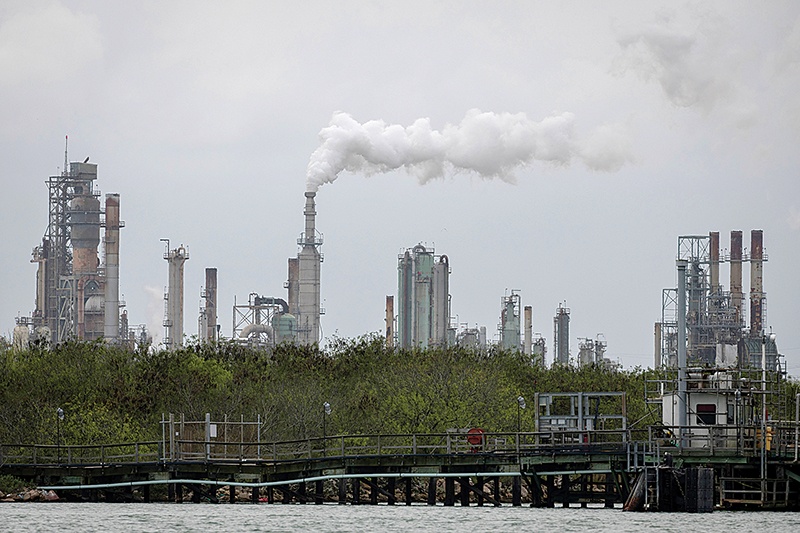

WASHINGTON: Theworld's largest economy grew a little more slowly in the second quarter thanpreviously thought, the government reported yesterday, with new data showingweaker oil exports and local government spending. GDP expanded in theApril-June period by 2.0 percent, down a notch from the initial 2.1 percentgrowth estimate and well below President Donald Trump's three percent target,according to the Commerce Department. Recession indicators in recent weeks havebegun to flash warning signs, and though the American economy is stilloutpacing the rest of the industrialized world, it has begun to sputterworryingly in some areas.
Still, corporateprofits rose in the second quarter, according to newly available figures, afterfalling at the start of the year. While largely confirming economists'expectations, the second quarter GDP numbers nevertheless marked a sharpslowdown from the heady pace of growth at the start of the year.
Whileunemployment remains low, hiring has slowed in 2019, and business investmenthas dropped sharply. Investors have become increasingly worried a recession inthe rest of the world and the Brexit turmoil will spill over into the UnitedStates-already stressed by Trump's grinding trade conflicts with China. But asolid bump in consumer spending-on health care and retail goods-provided a doseof good news and offset the weaker areas.
The numbersconfirmed the growing divide between consumers and big business, which havesharply curtailed investment in new factories as the trade war has shaken theirconfidence, disrupting supply chains and raising prices. While investment instructures was its weakest in more than three years, private consumption ofnon-durable goods was the strongest since 2003.
Tourism andtravel was another sore spot, as falling revenues from foreign visitors helpedshave a half percentage point off growth in exports of services, hittinghotels, restaurants and tourist attractions.
Trump has byturns denied that the US economy is weakening or sought to blame the FederalReserve for failing to cut interest rates fast enough. A real estate magnate,Trump campaigned on his stewardship of the economy, so signs growth isfaltering could potentially jeopardize his chances at winning a second term innext year's elections. But economists worry that, with interest rates alreadyvery low, the Fed may have little room to maneuver should a recession arrive,while a divided Congress and soaring deficits may make fiscal stimulus unlikelyat best.
Meanwhile, theTrump administration made official its extra 5 percent tariff on $300 billionin Chinese imports and set collection dates of Sept 1 and Dec 15, promptinghundreds of US retail, footwear, toy and technology companies to warn of pricehikes. The US Trade Representative's office said in an official notice thatcollections of a 15 percent tariff will begin at 12:01 am EDT (0401 GMT) Sundayon a portion of the list covering over $125 billion of targeted goods from China.
This initialtranche includes smartwatches, Bluetooth headphones, flat panel televisions andmany types of footwear. US Customs and Border Protection will also startcollecting a 15 percent tariff on Dec. 15 on the remainder of the $300 billionlist, including cellphones, laptop computers, toys and clothing, USTR said inthe Federal Register filing.
A USTR spokesmansaid on Wednesday that the agency would issue a separate Federal Registernotice with details of Trump's planned tariff increase to 30 percent on $250billion in goods that have already been hit with a 25 percent tariff, includingprocedures for collecting public comments on the move.
Hundreds ofretailers, footwear companies and business groups urged Trump to scrap theproposed tariffs, warning they would jack up consumer prices and trigger joblosses. More than 200 US footwear companies on Wednesday said the added 15percent duties on shoes would come on top of tariffs that already average 11percent and reach 67 percent on some shoes, boosting costs for consumers by $4billion every year. "Imposing tariffs in September on the majority of allfootwear products from China - including nearly every type of leather shoe -will make it impossible for hardworking American individuals and families toescape the harm that comes from these tax increases," the companies wrotein a letter to Trump.
More than 160other business groups, including the National Retail Federation, RetailIndustry Leaders Association and Association of Equipment Manufacturers, alsourged Trump to postpone the tariffs, warning they would hit Americans in themiddle of the busy holiday shopping season. Global markets remain on edge afterthe latest flurry of tit-for-tat tariffs, and the lack of firm details on thenext round of trade talks. - Agencies

